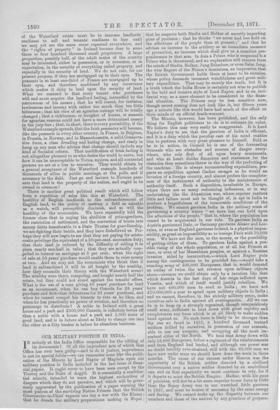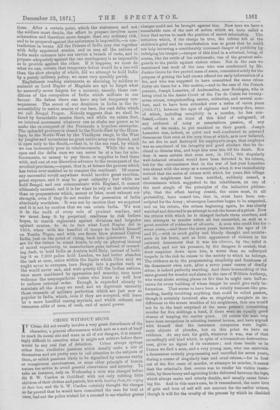OUR MILITARY POSITION IN INDIA.
IS nobody at the India Office responsible for the editing of its documents ? Of all the imprudent acts of which that Office has ever been guilty—and to do it justice, imprudence is not its special foible—we can remember none like the publi- cation of the Minute by Lord Napier of Magdala upon our military position in India included in the last issue of finan- cial papers. It ought never to have been seen except by the Viceroy and the Duke of Argyll. It is essentially a confiden- tial minute, intended to warn the highest authorities of dangers which they do not perceive, and which will bo griev- ously aggravated by the publication of a paper warning the most jealous of the surviving Native Princes that the British Commander-in-Chief expects one day a war with the Nizam ; that he dreads the military preparations making in Nepal ;
that he suspects both Sindia and Holkar of secretly importing guns of precision ; that he thinks " we never had less hold on the affections of the people than at present ;" and that he advises an increase to the artillery as an immediate measure of precaution, an increase which shall give us a manifest pre- ponderance in that arm. In Asia a Prince who is suspected is a Prince who is threatened, and no explanation will remove from the minds of Sindia, Holkar, Jung Bahadoor, or even Salar Jung, the wise Regent of the Nizam's dominions, an impression that the British Government holds them at heart to be enemies, whose policy demands incessant watchfulness and great mili- tary expenditure. That may be merely the truth, but it is a truth which the India House is certainly not wise to publish in the bold and incisive style of Lord Napier, and in an inci- dental way, as a more element to be considered in the finan- cial situation. The Princes may be less sensitive now, though secret arming does not look like it, but fifteen years ago a minute like this would have had much of the effect on their minds of an official death-warrant.
The Minute, however, has been published, and the only thing for English politicians to do is to estimate its value. We believe this may very easily be exaggerated. It is Lord Napier's duty to see that the garrison of India is efficient, and it is a duty which the peculiar cast of his mind enables him to perform with very great pleasure to himself. Bold as he is in action, in Council he is one of the forecasting Generals who see obstacles and sources of danger every- where, who rely first of all upon heavy armaments, and who at heart dislike financiers and statesmen for the obstacles they sometimes throw in the way of the perfecting of the machine. He is always recommending expenditure, pre- pares an expedition against Cachar savages as he would an invasion of a foreign country, and almost prefers the complete- ness of the instrument of authority to the maintenance of
authority itself. Such a disposition, invaluable in Europe, whore there are so many restraining influences, or in any undertaking like the Abyssinian war, where expense matters little and failure must not be thought of, is apt in India to produce a forgetfulness of the immovable conditions of the problem. We cannot garrison India in the military sense of garrisoning a country whore " we have lost our hold upon the affections of the people," that is, whore the population has ceased to be acquiescent in our rule. To garrison India as Austria garrisoned Italy, or Germany garrisons Alsace and Lor- raine, or even as England garrisons Ireland, is a physical impos- sibility, as great an impossibility as to besiege Paris with 10,000 men. We have not the mon, or the money, or the possibility of getting either of them. To garrison India against a pos- sible rising of the whole population, or of all her Princes at once, or even of her Mussulman peoples, or against a Russian invasion aided by ineurrection,—which Lord Napier puts among the contingencies to be provided for,—would take a standing army of 400,000 Europeans, that is, would demand an outlay of twice the net revenue upon military objects alone—revenue we could obtain only by a taxation like that which Austria in the last days of her reign inflicted upon Venetia, and which of itself would justify rebellion. We have not 400,000 men to send to India ; we have not £70,000,000 a year to spend upon military objects in India ; and we cannot, therefore, in the strictly military sense, make ourselves safe in India against all contingencies. All we can do is to keep up a strongly organized, though comparatively small army, sufficient to beat down with great rapidity and completeness any force which is at all likely to make sudden head against us. No such force is likely to be stronger than the one we faced in 1857, a hundred thousand trained soldiers drilled by ourselves, in possession of our arsenals, able to use our weapons, and occupying all the most im- portant cities of the North. We boat that Army down with only 18,000 Europeans, before a regiment of the reinforcements sent from England had landed, and although our power was no doubt terribly over-strained, still with the 00,000 men wo have now under arms we should have done the work in three months. The cause of our success under Heaven was the superiority of the British soldier directed by a civilized Government over a native soldier directed by an uncivilized one, and on that superiority we must continue to rely, for if it departs so must the British Empire. Holkar, with his guns of precision, will not be a bit more superior to our force in 1880 than the Sepoy Army was to our wretched little garrison in 1857, and must be beaten if necessary by the same energy and daring. Wo cannot make up the disparity between our numbers and those of the natives by any grandeur of prepare-
tions. After a certain point, which the statesmen and not the soldiers must decide, the effort to prepare involves more exhaustion and therefore more danger, than any ordinary risk, and to be prepared against the unforeseen is impossible,—a con- tradiction in terms. All the Princes of India may rise together with fully appointed armies, and so may all the nations of India make entrance into our service a breach of caste, and to prepare adequately against the one contingency is as impossible as to provide against the other. If it happens, we must do what we can, certain that temporary defeat would be a less evil than the slow atrophy of which, did we attempt to hold India by a purely military policy, we must very speedily perish. Englishmen reading statements so alarming by soldiers so eminent as Lord Napier of MagdaIa are apt to forget what he assuredly never forgets for a moment, namely, those con- ditions of the occupation of India which militate in our favour. No defeat there can have any but temporary con- sequences. The secret of our dominion in India is the in- accessibility to native armies of our base, the vast delta which we call Bengal Proper. Nobody suggests that we shall be faced by formidable armies there, and while we retain that, no internal movement whatever can so shake our power as to make the re-conquest of the Peninsula a hopeless enterprise. The splendid province is closed to the North-East by the Hima- laya, to the North-West by the Vindhyan range, to the West by jungles and mountains no great native army can thread, and is open only to the South,—that is, to the sea road, by which we can incessantly pour in reinforcements. While the sea is open and the delta ours we can never be at a loss for rein- forcements, or money to pay them, or supplies to feed them with, and can at our discretion advance to the reconquest of the revolted provinces,—repeat, that is, at leisure the process which has twice over enabled us to conquer the continent. Of course any successful revolt anywhere would involve great exertion, great expense, and it may be great calamity ; but while we hold Bengal, and can communicate with England, it cannot ultimately succeed, and it is far wiser to rely on that certainty than on preparations which, sooner or later, must exhaust our strength, even if they do not render the possession of India absolutely worthless. It was not by caution that we acquired and it is not by caution that we can retain India. We won it in the teeth of every rule of prudent warfare, and we must keep it by perpetual readiness to risk forlorn hopes, to march regiments against divisions and brigades against armies, to do in fact what Lord Napier did in 1858, when with his handful of troops he hurled himself on Tantia Topee, and with one fierce blow stunned Central India, just on the point of rising, back into quiescence. If we are for the future to count heads, to rely on physical instead of moral superiority, to manufacture guns instead of reward- ing dash, to hold India as Austria held Italy, instead of hold- ing it as 7,000 police hold London, we had better abandon the task at once, retire within the limits which Clive said we ought never to overpass, turn Bengal into a garden such as the world never saw, and wait quietly till the Indian nations, once more maddened by oppression and anarchy, once more welcome the unsympathetic rulers who know so well how to enforce external order. Enough is expanded already to maintain all the Army we need, and we deprecate earnestly those counsels of military perfection which are just now so popular in India, which, even if they are accepted, will leave us a mere handful among myriads, and which exhaust our resources alike of men, of cash, and of moral power.











































 Previous page
Previous page